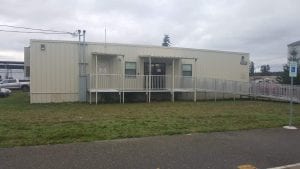Breathe in, breathe out. In a world of overstimulated, overwhelmed and over-scheduled lives, how are we to find moments of peace and quiet? According to First Lieutenant Colleen Seamands, yoga and meditation could be the answer. It was at a recent military spouse retreat that I found myself more at ease than ever before. It helped that free onsite childcare was offered to occupy the children, but more than that, it was the time and attention to body, mind and breath that had everyone at ease.
It was there that Lt. Seamands led a room of around 45 spouses through a yoga and mindfulness practice. Mindfulness, a trendy term in today’s culture, is nothing more than trying to clear the mind and being focused on your breathing, however, it is easier said than done. That is the reason this approach is one of the many classes offered not only to active military service members, but also to the families and children.

Lt. Seamands knows the importance of this practice. “I am a clinical social worker in the army. I started teaching yoga when I lived in DC, before I joined the army working at the Pentagon and taking yoga classes there. I thought it would be cool to do that too, so I took my yoga teaching training at a place in DC and then left to go to grad school.”
Now, Lt. Seamands primarily provides independent treatment for anybody who is either a command referral or self referral. While she is still navigating ways to add yoga into her practice, the facility does offer many classes for members.
“Anyone can come in and seek treatment from things like occupational stress, or marital stress, the everyday things people encounter,” she said. Each brigade has its own behavioral health clinic and special forces has its own clinic, too.
While they prefer those interested to seek out assistance by self-referral, sometimes it is recognized by command that someone has an issue. “Everyone undergoes different treatment plans and it’s up to the provider. With the army, its based on availability, training schedules, to make sure needs are met coming through the door.”
It is not always just the service member seeking help. If a service member would like to include the entire family, then treatment can be done at the Child and Behavior Health Services. Military spouses and dependents, including children, are welcome at that clinic as well.
The behavior health clinic offers mindfulness and acceptance classes like yoga and mindfulness stress reduction which, according to Lt. Seamands, is a meditative approach to therapy offered to all service members in the clinic.

“I think the really nice thing about mindfulness in particular is that elements of it can be infused in your daily life,” said Lt. Seamands. “If you have only five minutes, you can use mindfulness. It has many benefits. It’s a really accessible treatment and the population is becoming more open to it. Sometimes we hear mindfulness or yoga and we think it’s too hippie, but I absolutely think we are encouraging it because of its accessibility and because it’s evidence based.”
If you only have a few minutes to practice mindfulness, Lt. Seamands recommends this approach:
- Find a seated posture, comfortable to you.
- Close your eyes, if that’s available to you.
- Breathe in for a count of three.
- Exhale for a count of three.
- Try to clear your mind.
“Typically what we encourage is a relaxation breath, which can take a lot of different forms. That’s a brief, non-prescription meditation. Truth is, there’s no real look to what meditation has to look like. It’s really what’s most available to the person. The trick is connecting with the breath and allowing your body to reflexively calm down. It could be running. The work in it is taking an inventory of where you are in the present moment and letting go of all peripheral, like what you’re feeling, what you’re thinking…and letting go of all that. If that happens to you when you’re swimming, running, cleaning, whatever it is, be mindful of it.”
If you are interested in classes offered, take a trip to the many clinics on post. While services are spread out around JBLM, there are two at the old Madigan annex building and the others are close to the units they serve. The special operations forces clinic is located at BLDG R3150, 3rd Division Drive, and is open Monday-Friday 7:30 a.m. – 4:00 p.m. Service members can walk in at any time and be seen by a provider during business hours.
For more information about the behavioral health department at Madigan, visit this page.


































